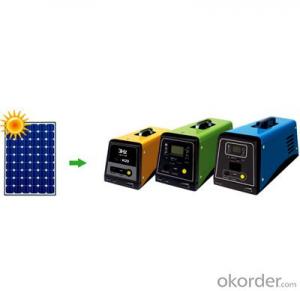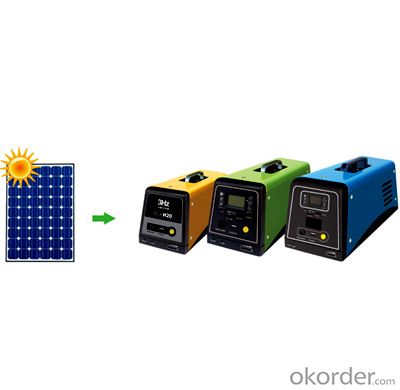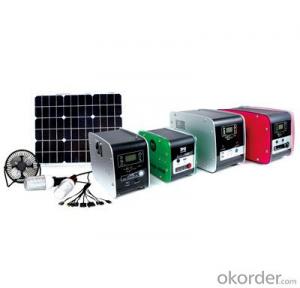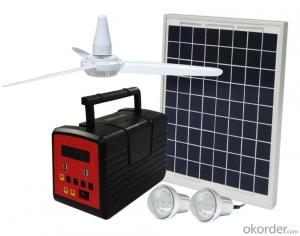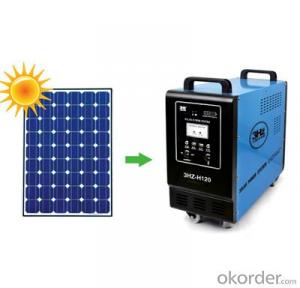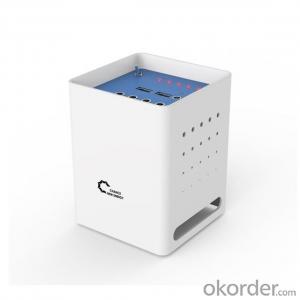Solar Energy Systems California:Portable Solar Generator with MP3/Solar Power System Free Shipping
- Loading Port:
- China Main Port
- Payment Terms:
- TT OR LC
- Min Order Qty:
- -
- Supply Capability:
- -
OKorder Service Pledge
OKorder Financial Service
You Might Also Like
Our new solar power system integrates stereo receiver, MP3 Player with audio speaker. Of course, its basic function is to generate electricity. The solar power system possesses LCD, volume controller, switch, LED indicator light and high-quality audio speaker, etc. It is humanized, energy saving and environmentally friendly. Also, the solar power system is easy to use.
3HZ-HP80W Solar Power System is specially designed for houses in rural area where grid electricity is unavailable. The system has advantages of automatic self-control and self-protect, best configuration, stable quality, noise-free, easy to install, easy to use, and long-lifetime.
Intelligent Charging Control - The system automates battery charging process in different modes, enhance charge, direct charge or float charge to extend battery lifetime.
Smart Power Supply - The inverter system automates voltage stabilizer, energy-saving compensation, and inverter functions. Multiple DC output options 5V and 12V. 5V DC power is suitable for cellphone charging, and 12V DC power can be used for small electrical appliances. One Direct 220V AC output which is suitable for lighting, television, electric fans and other household appliances.
Energy Saver - When the inverter system detects no AC output for 5 mins, it will shutdown DC - AC inverter feature to minimize internal power consumption.
Smart Soft-Start control - The inverter system is designed to accept high-resistance shock loads to ensure normal startup and power output capability.
parameters :
Operating temperature :-20~+70
Radio: FM 87.5-108MHz
Sound function: TF, MICRO SD, PLAY MP3
LIN-IN: MP3/ computer/CD/ mobile phone
Case Shell optional: Aluminum allay, organic material
Peak power:456W
Solar panel: 80W
Battery: 12V/38AH
Inverter: 220V/300W
Controller: 12V/5A
MINI Audio Radio with MP3
Output port: USB: 5V DC: 12V
Charging time Solar panel 4hours can be full charge.
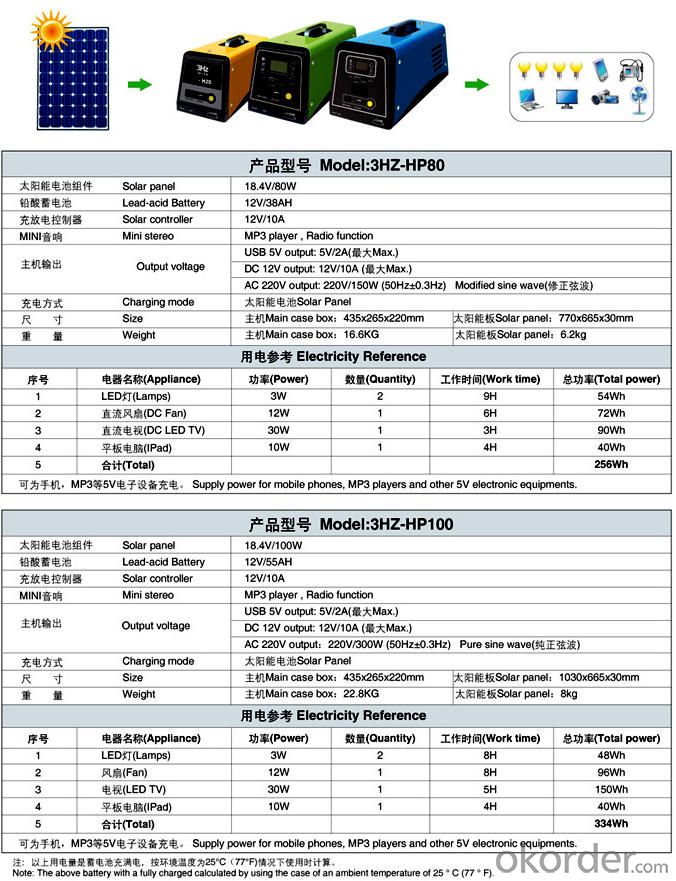
- Q: How do solar energy systems affect job growth in the renewable energy sector?
- Solar energy systems have a positive impact on job growth in the renewable energy sector. The installation, maintenance, and manufacturing of solar panels create numerous employment opportunities. Additionally, the growth of the solar industry prompts the development of related sectors, such as research and development, engineering, and sales, further contributing to job creation. Overall, solar energy systems play a significant role in fostering job growth within the renewable energy sector.
- Q: Can solar panels be installed on carports or parking structures?
- Yes, solar panels can be installed on carports or parking structures. This is known as solar carports, which utilize the space on top of carports or parking structures to generate solar energy. This not only provides shade for parked vehicles but also allows for the production of clean and renewable energy.
- Q: How do solar energy systems impact the aesthetics of a building?
- Solar energy systems can have a positive impact on the aesthetics of a building by providing a sleek and modern look, especially when integrated into the design. With advancements in technology, solar panels are becoming more visually appealing and can enhance the overall appearance of a building rather than detract from it. Additionally, solar energy systems can also contribute to a building's sustainability and eco-friendly image, improving its overall appeal.
- Q: What is the maintenance process for solar panels?
- Solar panels require regular cleaning, inspection, and occasional repairs for proper maintenance. To maximize sunlight absorption and maintain efficiency, it is important to clean the panels with a soft brush or cloth and mild detergent, avoiding abrasive materials or harsh chemicals. Regular inspections are crucial to detect any potential issues or damages. Homeowners or professional solar panel technicians can perform these inspections at least once or twice a year, or after severe weather conditions. Loose connections, cracks, or signs of wear and tear should be checked for. If repairs are needed, it is best to contact a professional technician or the manufacturer who has the expertise to handle them safely. Attempting repairs without proper training can lead to further damage or safety risks. Monitoring the performance of the solar panels is also essential. Many modern systems offer monitoring tools that allow homeowners to track energy production and identify any potential issues. Regularly reviewing this data helps address drops in efficiency or irregularities promptly. By following a regular maintenance routine, homeowners can ensure their solar panels generate clean and renewable energy efficiently, potentially extending their lifespan to 25 years or more.
- Q: Can solar energy systems be used for powering electric vehicles charging stations?
- Yes, solar energy systems can be used to power electric vehicle charging stations. Solar panels can generate electricity from sunlight, which can then be stored in batteries or directly used to charge electric vehicles. This renewable energy source is environmentally friendly and can help reduce the carbon footprint associated with transportation.
- Q: How can solar energy systems reduce electricity bills?
- Solar energy systems can significantly reduce electricity bills by generating free and renewable energy from the sun. Unlike traditional electricity sources, such as fossil fuels, solar energy does not require ongoing costs for fuel or maintenance. Once a solar energy system is installed, it can produce electricity for many years, offsetting a significant portion of a household or business's electricity consumption. By harnessing the power of the sun, solar energy systems can generate electricity during daylight hours, when energy demand is typically at its highest. This means that solar energy can directly offset the electricity consumption during peak times, reducing the need to draw power from the grid. As a result, electricity bills can be significantly reduced or even eliminated, depending on the size and efficiency of the solar energy system. In addition to reducing electricity bills, solar energy systems often allow homeowners and businesses to take advantage of various financial incentives and programs. These can include tax credits, grants, or net metering policies, which allow excess solar energy to be fed back into the grid and credited towards future electricity bills. These incentives can further enhance the financial benefits of installing solar energy systems, making them even more cost-effective. Moreover, solar energy systems offer long-term savings. As the cost of electricity from traditional sources continues to rise, solar energy remains a stable and predictable investment. By locking in a fixed cost for electricity generation, solar energy systems provide protection against future price hikes and inflation, ensuring that electricity bills remain low and predictable for years to come. Overall, solar energy systems offer a sustainable and cost-effective solution to reduce electricity bills. By tapping into the abundant and free energy of the sun, households and businesses can enjoy substantial savings, financial incentives, and long-term stability in their energy costs.
- Q: How do solar energy systems impact the insurance coverage of a home?
- Solar energy systems can have both positive and negative impacts on the insurance coverage of a home. On the positive side, installing solar panels can increase the value of a home, which may result in higher replacement costs in the event of damage or loss. This can lead to higher insurance coverage limits to ensure adequate protection. Additionally, some insurance companies offer discounts or incentives for homeowners who install solar energy systems. These discounts can help offset the cost of insurance premiums and make it more affordable for homeowners to insure their homes. However, there are also potential negative impacts to consider. Solar panels can be vulnerable to damage from natural disasters such as storms, hail, or fire. Depending on the insurance policy, the coverage for such damages may vary. Some policies may include coverage for solar panels as part of the overall structure of the home, while others may require an additional endorsement or separate policy. Another consideration is liability coverage. If a solar energy system causes damage to neighboring properties or injures someone, homeowners may need to ensure they have adequate liability coverage to protect against potential lawsuits. It is important for homeowners to review their insurance policies and consult with their insurance providers before installing solar energy systems. This will ensure that they have the appropriate coverage in place and understand any potential changes or requirements that may affect their insurance premiums or coverage limits.
- Q: Can solar energy systems be used in areas with limited access to electricity grids?
- Yes, solar energy systems can be effectively used in areas with limited access to electricity grids. Solar panels can be installed in such areas to harness sunlight and convert it into electricity, eliminating the need for connection to traditional power grids. This enables communities and individuals to access clean and renewable energy, powering their homes, businesses, and other activities. Additionally, solar energy systems can be combined with energy storage solutions, such as batteries, to store excess energy for use during nighttime or cloudy periods, further ensuring a reliable and continuous power supply.
- Q: What is the impact of snow or ice on solar energy system performance?
- Snow or ice can significantly impact the performance of a solar energy system. When snow or ice covers the solar panels, it prevents sunlight from reaching the photovoltaic cells, reducing the system's energy production. Additionally, the weight of snow or ice on the panels can cause structural damage or lead to misalignment, further reducing the system's efficiency. Proper maintenance, such as snow removal or tilt adjustments, is crucial to ensure optimal performance during winter months.
- Q: Can solar energy systems be used for powering electric gates or fences?
- Yes, solar energy systems can be used to power electric gates or fences. Solar panels can be installed to convert sunlight into electricity, which can then be used to operate the gates or fences. This provides a sustainable and cost-effective solution, as it eliminates the need for traditional power sources and reduces reliance on the grid.
Send your message to us
Solar Energy Systems California:Portable Solar Generator with MP3/Solar Power System Free Shipping
- Loading Port:
- China Main Port
- Payment Terms:
- TT OR LC
- Min Order Qty:
- -
- Supply Capability:
- -
OKorder Service Pledge
OKorder Financial Service
Similar products
Hot products
Hot Searches
Related keywords
